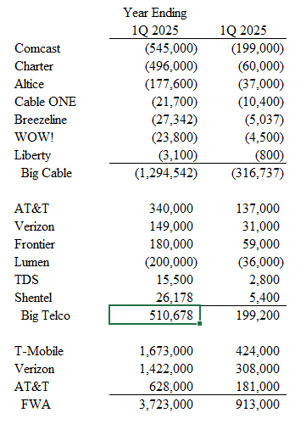 Your new post is loading...
 Your new post is loading...
WASHINGTON, May 20, 2025 - Mercury Broadband in Mission, Kan., is asking the Federal Communications Commission to waive a $25 million penalty over the regional wireless and fiber ISP’s decision to surrender thousands of locations awarded by the FCC in a reverse auction conducted by the Rural Digital Opportunity Fund (RDOF) program five years ago.
DOGE DATA TRACKER — POLITICO just launched a new Pro tool to track the latest actions by Trump’s Department of Government Efficiency. A look at April and May alone reveals over 5,000 new contract, grant or lease cancellations. Pros can search new cuts, additions, and modifications by government agency, contractor, or congressional district. Stay in the loop by adding “DOGE data” to your POLITICO Pro news alerts to get updates as they drop. Or contact an account manager to get set up. The Trump administration’s apostle of cutting-edge science laid out a sweeping vision this week for blending the White House’s ongoing conservative culture war with continued American technological dominance. “Science cannot be subject to ideology, nor should scientists march blindly in lockstep,” Office of Science and Technology Policy director Michael Kratsios told the National Academy of Sciences Monday. “Blindly trusting in The Science, with a capital T and capital S, is inimical to free inquiry and open debate and is thus the enemy of scientific progress. The beginning of knowledge is the knowledge of ignorance … It is convention, dogma, and intellectual fad that resist revision and correction.” Kratsios’ comments were the clearest articulation yet of how the second Trump administration thinks it can serve three political constituencies that often seem at odds: hardcore budget raiders like Office of Management and Budget chief Russell Vought, culture warriors obsessed with fighting “wokeness” and the ascendant, venture capital-powered tech right.
A dozen senators, including Senator Klobuchar, sent President Trump a letter asking that his Administration not delay BEAD funding… We write with concern regarding the National Telecommunications and Information Administration’s (NTIA) recent announcement that it is delaying the Broadband Equity, Access, and Deployment (BEAD) program. This unprecedented move by the NTIA will further delay our…
Vero Fiber has announced completion of the first phase of their fiber-internet construction project in a Colorado city.
Felix Dialoiso, well versed in the complexities of municipal regulations, says building underground fiber doesn't come without struggles.
FCC Chairman Brendan Carr is now maneuvering to harm our democratic process with 4 deregulation orders, all tied together, so that no one would know that there is not 1, or 2 or 3 separate proceedings, but 4 different Orders, and most were passed with no comment period and no other Commissioners invited. And forget the formalities, this is being done by the Wireline Bureau, and has been presented as a press release from the Chairman, with no docket numbers or any formal normal presentation to indicate this was a package of harms and burdens on the public. And after we filed to request for a full review of these slight of hand procedures, USTelecom, the wireline association historically tied to AT&T et al,. decided to go after the IRREGULATORS to block our call to halt these proceedings and start again so that the public and the other commissioners can add their issues, concerns, and corrections of the biased -corporate information that the FCC is quoting as being a solution set for the Digital Divide. Let us explain and start again. Click headline to read more--
Meta can proceed with an attempt to block the FTC from imposing new restrictions on teens' data, a federal appellate court ruled Friday.
The Consumer Financial Protection Bureau has withdrawn proposed data broker regulations that were opposed by the industry group Privacy for America.
Elon Musk’s control of space is even more entrenched than it seems. What dangers could that lead to?
This week: Angela Siefer, executive director of the National Digital Inclusion Alliance (NDIA), on the impact of President Trump 'ending' the $2.75 billion Digital Equity Act and how advocates can fight to restore it.
President Donald Trump’s whirlwind tour of the Gulf last week – and the attendant blitz of AI dealmaking – promised numbers so absurd they seemed mystical. And no company was more at the center of the action than Nvidia. The Santa-Clara based company, which makes the powerful chips core to training the world’s most sophisticated AI models, signed a deal to sell “several hundred thousand” of its most advanced chips to Saudi Arabia. Another deal is reportedly under discussion for Nvidia to sell more than a million chips to the UAE. Nvidia has recently emerged as a tentpole of the U.S. tech renaissance promised by Trump.
A sweeping preemption provision tucked into a federal budget bill would be a major step backwards in AI policy.
Boston — The Healey-Driscoll Administration is raising the alarm about the Trump Administration’s recent action to terminate $14.1 million in federal funding to expand internet access for veterans, rural communities and individuals with disabilities in Massachusetts. The previously awarded funding from the Digital Equity Act (DEA) Capacity Grant Program would have provided communities with the tools, skills and resources to expand the adoption and use of high-speed internet service. “Everyone deserves access to the internet. It’s essential for being able to participate in our economy and utilize the resources and services that so many of us rely on,” said Governor Maura Healey. “It’s terrible that the Trump Administration is blocking our efforts to bring internet access to veterans, rural communities and individuals with disabilities across the state.”
|
A 1990s real estate deal helped make the downtown block more about computing power than clothing sales.
"It's our FUCKING STORE." Apple decided not to obey a court order telling it to open its app store to Fortnite. Yesterday Judge Yvonne Gonzalez Rogers smacked them down, backed up by an appeals court.
Projects in more than a dozen counties supported by the Oklahoma Broadband Office and Resound Networks have officially been launched in May.
Charter Communications and Cox Communications have entered into a "definitive agreement to combine their businesses."
For most the dozen years I've been writing this blog, the biggest cable companies accounted for almost all of the growth in broadband customers. Quarter after quarter, and year after year, the big cable companies were the source of almost all new net broadband customers. This started to shift a few years ago when FWA…
For over a decade, Charter and Comcast focused on the necessary strength around other communication businesses - broadband and especially mobile - and were turned down by the FCC in 2002. Now both
companies carry much less marketplace dominance, making it much a more likely scenario.
Amber Scorah and Psst are building a “digital safe” to help people shine a light on the bad things their bosses are doing, without getting found out.
The FCC report summarizes information about Internet access in the United States as of June 30, 2024, as collected by FCC Form 477 and the Broadband Data Collection (BDC). Here are their key takeaways… Typical Speeds • The median downstream speed of all reported fixed connections was 300 Mbps and the median upstream speed was…
Phoenix is on the verge of enacting zoning regulations to limit where data centers can be located. Why it matters: Data centers use large amounts of energy and space and can bring negative effects like noise pollution to surrounding communities, per an analysis by city staff. State of play: The city wants to direct data centers away from mixed-use, walkable and transit-oriented communities. - They create few jobs, take up land that could be used for employment and housing, and make "inactive" stretches of street, staff wrote.
Zoom in: Under the proposal, data centers would be restricted to areas zoned for industrial and some commercial use.
Trump’s first few months back in the Oval Office have been a concerted effort to assert authoritarian control. In the wake of the 2024 election results, the Open Technology Institute (OTI) has closely observed the direction of U.S. tech policy under a second Trump presidency. OTI is a program that envisions all Americans having access to technology and its benefits. Underlying this vision are principles of openness and privacy. We hoped this administration would continue to uphold some of the basic principles that have steered the open web for much of its lifespan—openness, security, and innovation. As part of New America’s Technology and Democracy programs, we highlighted five key tech policy directions—not tailored to a particular political party but instead focused on advancing fundamental policies that ensure emerging technologies serve the public good. We urged the Trump administration to prioritize:
In three years, air traffic controllers will move from tracking planes with handwriting on paper strips to computer terminals.
Is this finally going to be the year when the largest ISPs gobble up everybody else of size? There was big news in the industry on Friday when Charter announced it is merging with Cox Communications. Cox has over 6.5 million customers and the combined business will be the largest ISP that covers over 70…
|





 Your new post is loading...
Your new post is loading...
























